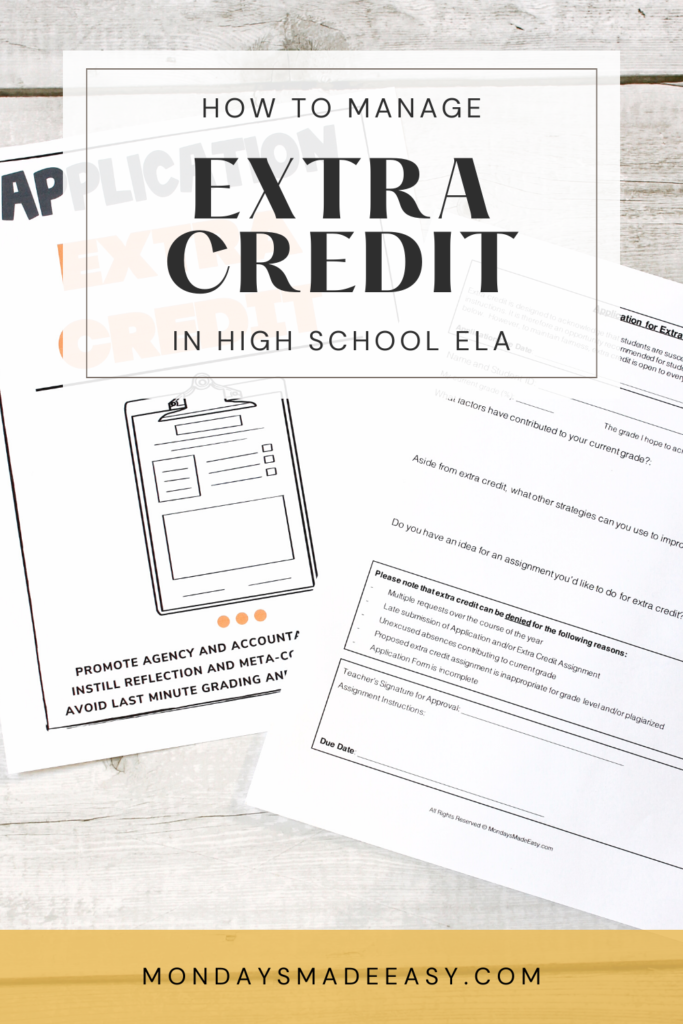Close to the end of the semester, you likely get requests from students to complete extra credit assignments. You might be looking for extra credit assignment ideas, or maybe you’re wondering if extra credit should be allowed in the first place. Maybe you find last-minute requests annoying – grading extra credit projects can be frustrating and confusing! In this blog post, I’ll share some reasons to consider extra credit in your classroom. It can be an enriching learning opportunity for your students. You’ll also receive some examples of extra credit assignments, along with some strategies to stay organized with extra credit assignments.
Is Extra Credit a Good Thing?
Not everyone agrees that students deserve extra credit. Many teachers believe in only assigning “regular” credit. Sometimes the top performers in our class request the opportunity to boost their grades. Oftentimes, students who have unfinished assignments or lower grades request extra credit too. Teachers who do not assign extra credit often decline these requests to emphasize the importance of turning in regular assignments on time.
Meanwhile, some teachers do not assign extra credit because their schools do not allow it. School-wide policies may not permit extra credit in order to promote equitable grading practices. Before you decide whether or not you will offer extra credit, be sure to check your school’s policy. If you are considering incorporating extra credit assignment ideas, make sure they align with your school’s guidelines and educational goals.

Equitable Extra Credit Policies
Another place to consult before assigning extra credit is with any staff that teaches the same course as you. If either one of you approaches extra credit differently, your students may interpret this as inequitable. One of the main reasons that teachers believe students do not deserve extra credit is that it is unethical. There are ways to ensure that extra credit is equitable, but you will need to ensure that your colleagues are in agreement.
Students deserve extra credit when it is an opportunity offered to everyone. To ensure that your policies are ethical and equitable, do not assign extra credit on a case-by-case basis. This does not mean that everyone needs to complete an extra credit assignment. This also does not mean that every extra credit assignment needs to be the same. Equity is about access. Case-by-case simply implies that you should not approve extra credit for one student and deny it for another – unless there is a valid reason to do so.
Whether you believe students deserve extra credit or not, be sure to include your policy in your syllabus. If you allow extra credit, you may also wish to note your requirements. For inspiration, consider using some extra credit assignment ideas from Mondays Made Easy which includes an Extra Credit Application with our Editable Full Course Syllabus Template.
Why Should Teachers Give Extra Credit?
Teachers should give extra credit if they support differentiation for students. When implemented properly, extra credit assignments can be a fantastic way to differentiate for different learner profiles. Many teachers hold the belief that a student’s grade in a course should reflect their understanding of the curriculum. In an equitable setting, there should be several opportunities to demonstrate that understanding.
There are multiple reasons why a student may perform poorly on an assessment. There are also multiple factors that may prevent students from being present in class or turning in work on time. Extra credit assignments, when assigned to correlate with your curriculum requirements and course expectations, provide students with another opportunity to meet course standards.
This is especially true if the extra credit is able to assess learning goals while catering to different learning styles. I saw a great example the other day of a student who baked a literal cake of symbolic elements from The Great Gatsby. Their write-up described the literary elements in the novel in relation to the cake: from rum-flavored icing to pearl necklace piping, this culinary creation fused course requirements with the student’s passion!

Tips for Assigning Extra Credit
One reason why teachers hate extra credit is that it can be a real headache! Keeping track of extra credit assignments and due dates requires additional effort on our part. On top of that, grading additional assignments around report card time is stressful. Thankfully, these hardships are minimized with a simple system in place.
Mondays Made Easy’s FREE Extra Credit Application is a great tool to help you keep track of extra credit assignments and requests. Students typically ask for extra credit in person; an application provides a paper trail for these conversations. Additionally, an application provides space to note assignment instructions and due dates – if your students are anything like mine, they might need a reminder about these details.
Extra credit applications can also double as a metacognitive reflection tool. I often have students explain why they need the extra credit in the first place. This provides them the opportunity to reflect on their performance and participation in the course. If the same student repeatedly asks for extra credit in your class, it can also be useful to have a record of each request. This can provide you both with documentation to discuss the student’s habits and performance.
A final reason why I love using extra credit applications is that they encourage students to be proactive. I introduce my extra credit application with my syllabus at the start of the course. I notify students that I require extra credit applications to be submitted three weeks before report cards. This sets the expectation that extra credit requests should not be made last minute. I also schedule assignments to be turned in before grades are finalized. This eliminates any last-minute grading.
Extra Credit Assignment Ideas for English Class
To simplify extra credit assignment ideas, you can adopt the popular approach of offering an assignment re-do to students. This is the easiest way to avoid additional grading while accommodating extra credit requests.
Another approach to extra credit that requires very little assessment is to implement a pass system. At the start of the semester, you can provide each student with a number of passes. For example, each student might receive three hallway passes and one late pass. In order to receive extra credit, students must have all of their passes remaining at the end of the semester. If your school policy allows, you can give students bonus points for simply showing up to class on time and avoiding hallway distractions.
For novel studies, you can offer students the opportunity to create a movie trailer. This example for an extra credit assignment idea requires a bit of effort, but it is a great alternative assessment for older students. A movie trailer will prompt students to avoid simple plot summaries and establish characterization and theme. To facilitate this assignment, Mondays Made Easy offers a Movie Trailer Project Outline and Rubric.
If your students have written research essays, you can offer them the opportunity to turn their work into a “real-world resource.” A “real-world resource” is any type of media or document that delivers students’ research to the general public. This example of an extra credit assignment is a great opportunity for differentiation because it allows students to be creative and select any medium they like. Mondays Made Easy also offers a Real-World Resource Assignment Outline and Rubric.

Aligning Extra Credit Assignment Ideas with Your Curriculum
When it comes to selecting an extra credit assignment idea, the most important consideration should be how the assignment aligns with your curriculum. If you’re not sure what to assign for extra credit, one option could be to review the student’s performance. If they scored low on a particular assessment, it would make sense to opt for an assignment that covers similar curriculum strands.
For example, the Common Core State Standards require students to “write arguments to support claims in an analysis of substantive topics or texts, using valid reasoning and relevant and sufficient evidence” (English Language Arts Standards – Writing – Grade 9-10). If your student requesting extra credit scored lowest on an assessment for this strand, it would not be best practice to assess an argumentative writing assignment.
Mondays Made Easy’s Extra Credit Application prompts students to reflect on their performance in your course. It also offers them the opportunity to suggest extra credit assignment ideas. Oftentimes, students are able to recommend an assignment idea that evaluates similar skills to those that were evaluated poorly on a previous assessment. If their recommendation doesn’t align, you can facilitate a conversation to guide them in the right direction. This is a great way to implement differentiation and student choice. It also enables you to incorporate your students’ examples of extra credit assignments into your curriculum. Students have great ideas, and I’ve benefitted from reusing their suggestions with future classes!

Extra Credit Assignment Ideas: Important Takeaways
Assigning extra credit remains a matter of personal preference. You know what works best for your students, and your professional discretion will best determine whether or not extra credit is an opportunity that they need. As mentioned, it is best to check if your approach aligns with your school policy and your colleagues’ practices. If you do decide to offer your students extra credit assignments, I hope that the extra credit assignment ideas and suggestions in this blog post support you in your efforts!




